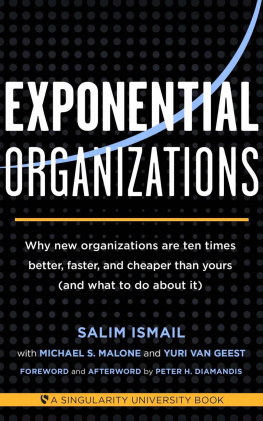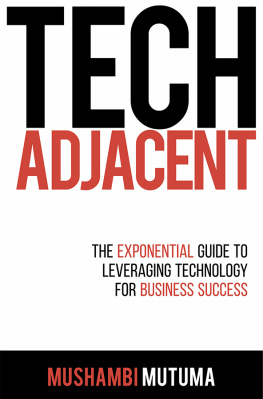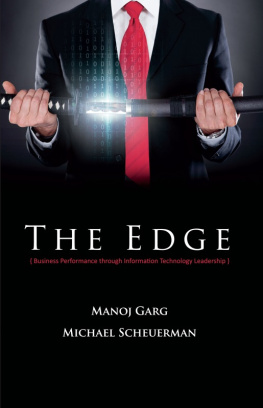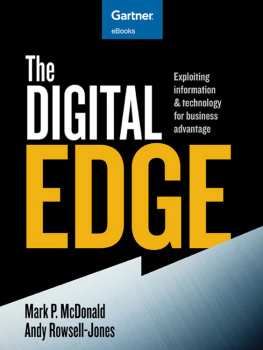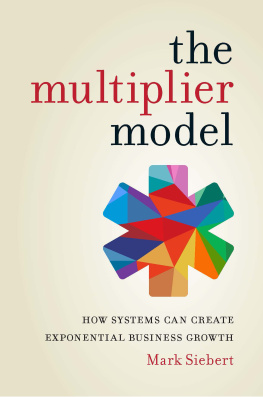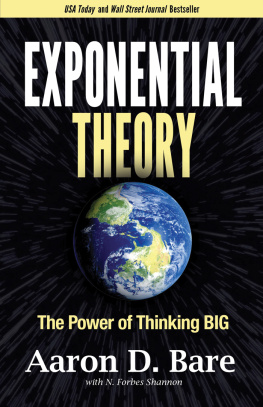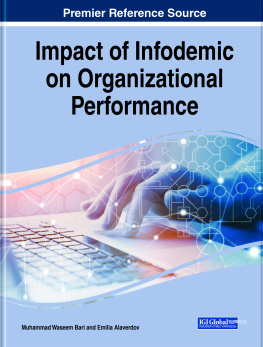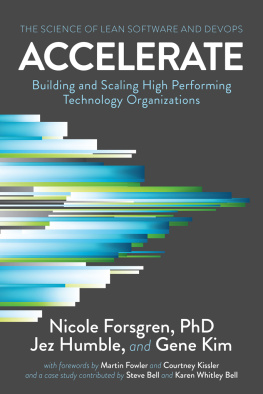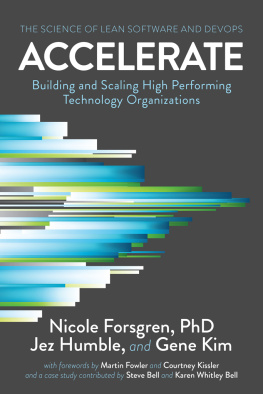Exponential Organizations
Why new organizations are ten times better, faster, and cheaper than yours
(and what to do about it)
Salim Ismail
with Michael S. Malone and Yuri van Geest
Foreword and Afterword by Peter H. Diamandis
Copyright
Diversion Books
A Division of Diversion Publishing Corp.
443 Park Avenue South, Suite 1008
New York, NY 10016
www.DiversionBooks.com
Copyright 2014 by ExO Partners LLC
All rights reserved, including the right to reproduce this book or portions thereof in any form whatsoever.
For more information, email
First Diversion Books edition October 2014
ISBN: 978-1-62681-358-8
Table of Contents
Foreword
Welcome to a time of exponential change, the most amazing time ever to be alive.
In the pages that follow, Salim Ismail, my colleague, friend and one of the leading thinkers and practitioners on the future of organizations, offers you a first look at what this new world will look likeand how it will change the way you work and live. Salim has studied and interviewed CEOs and entrepreneurs whose companies are leveraging a newly available set of externalities and, as a result, scaling their organizations at many times the normal rate of typical companies. More important, hes thought deeply about and analyzed how existing organizations need to adapt. For this reason, I cant think of a more perfect guide to those CEOs and executives interested in thriving during this time of disruptive change.
Have no doubt, Exponential Organizations: Why New Organizations are Ten Times Better, Faster and Cheaper Than Yours (And What To Do About It) is both a roadmap and a survival guide for the CEO, the entrepreneur and, most of all, the executive of the future. Congratulations on the successes that got you to this point in your career, but let me forewarn you that those skills are already out of date. The concepts in this book and the conversations that they spark are the new lingua franca for anyone wanting to remain competitive and stay in the game. In todays corporate world there is a new breed of institutional organismthe Exponential Organizationloose on Earth, and if you dont understand it, prepare for it and, ultimately, become it, you will be disrupted.
The concept of the Exponential Organization (ExO) first arose at Singularity University, which I co-founded in 2008 with noted futurist, author, entrepreneur-turned-AI director at Google, Ray Kurzweil. The goal was to create a new kind of university, one whose curriculum was constantly being updated. For that reason SU was never accreditednot because we didnt care, but because the curriculum was changing too fast. SU would focus only on the exponentially growing (or accelerating technologies) that were riding on the back of Moores Law. Areas like infinite computing, sensors, networks, artificial intelligence, robotics, digital manufacturing, synthetic biology, digital medicine and nanomaterials. By design and desire, our students would be the worlds top entrepreneurs, as well as executives from Fortune 500 companies. Our mission: to help people positively impact the lives of a billion people.
The idea for SU came together at a Founding Conference hosted at NASAs Ames Research Center in Silicon Valley in September 2008. What I remember most clearly from the event was an impromptu speech given by Google co-founder Larry Page near the end of the first day. Standing before about one hundred attendees, Page made an impassioned speech calling for this new university to focus on addressing the worlds biggest problems: I now have a very simple metric I use: Are you working on something that can change the world? Yes or no? The answer for 99.99999 percent of people is no. I think we need to be training people on how to change the world. Obviously, technologies are the way to do that. Thats what weve seen in the past; thats whats driven all the change.
One of the individuals in the audience listening to Page was Salim, who had headed up Brickhouse, Yahoos intrapreneurial incubator. He, too, was taken by that message, and within weeks, he joined Singularity as the universitys founding Executive Director. Salim, having run several startups before, navigated the usual crises that come with an early stage company and played a crucial role in making SU the success it is today. But perhaps most important of all, Salim pulled together the diverse thoughts and case studies taught at SU and wove them together into a vision for a new kind of company, one that operated at ten times the price performance of those just a decade ago.
It was my pleasure to help frame the attributes, concepts and practices exhibited by Exponential Organizations, and to join Salim, Yuri van Geest, and Mike Malone in developing this book. Together, we have had the great fortune to study and understand how accelerating technologies are changing the course of nations, industry and all of humanity, and to manifest Salims how-to guide for the Exponential Executive. Some of the work described in the chapters ahead emerged from my own book, Abundance: The Future Is Better Than You Think (co-authored with Steven Kotler), as a framing of where we all could end up, but most of it applies to the companies of today and how they need to navigate there.
Salims co-authors also deserve recognition. First is Yuri van Geest, a Singularity University graduate and one of the worlds leading experts in mobile, as well as a keen student of exponential technologies and trends. Yuri has a background in organizational design and has been materially involved since early on in the project. Second is veteran high-technology journalist Mike Malone. Mike is not only a world-class technology reporter, but also the inventor of two influential organizational models that preceded this book: the Virtual Corporation (with Bill Davidow) and the Protean Organization.
Salims vision of the Exponential Organization is a powerful one. Potent forces are emerging in the worldexponential technologies, the DIY innovator, crowdfunding, crowdsourcing, and the rising billionthat will give us the power to solve many of the worlds grandest challenges and the potential to meet the needs of every man, women and child over the next two to three decades. These same forces are now empowering smaller and smaller teams to do what was once only possible via governments and the largest corporations.
Three billion new minds will join the global economy over the next half-dozen years. The relevance of this is twofold. First, these three billion people represent a new population of consumers who have never bought anything before. Consequentially, they represent a long tail of tens-of-trillions of dollars of emerging buying power. If they are not your direct customers, fear not; they are likely your customers customers. Second, this groupthe rising billionis a new entrepreneurial class powered with the latest generation of Internet-delivered technologieseverything from Google and Artificial Intelligence, to 3D printing and synthetic biology. As such, we will see an explosion in the rate of innovation, as millions of new innovators begin to experiment and upload their products and services and launch new businesses. If you think the rate of innovation has been fast in recent years, let me be among the first to tell you: you havent seen anything yet.
Today the only constant is change, and the rate of change is increasing. Your competition is no longer the multinational corporation overseas, its now the guy or gal in the Silicon Valley or Bandra (Mumbai) garage using the latest online tools to design and cloud print their latest innovation.
But the question remains: how can you harness all of this creative power? How can you construct an enterprise that is as quick, adept and innovative as the people who will be part of it? How will you compete in this accelerated new world? How will you organize to scale?

